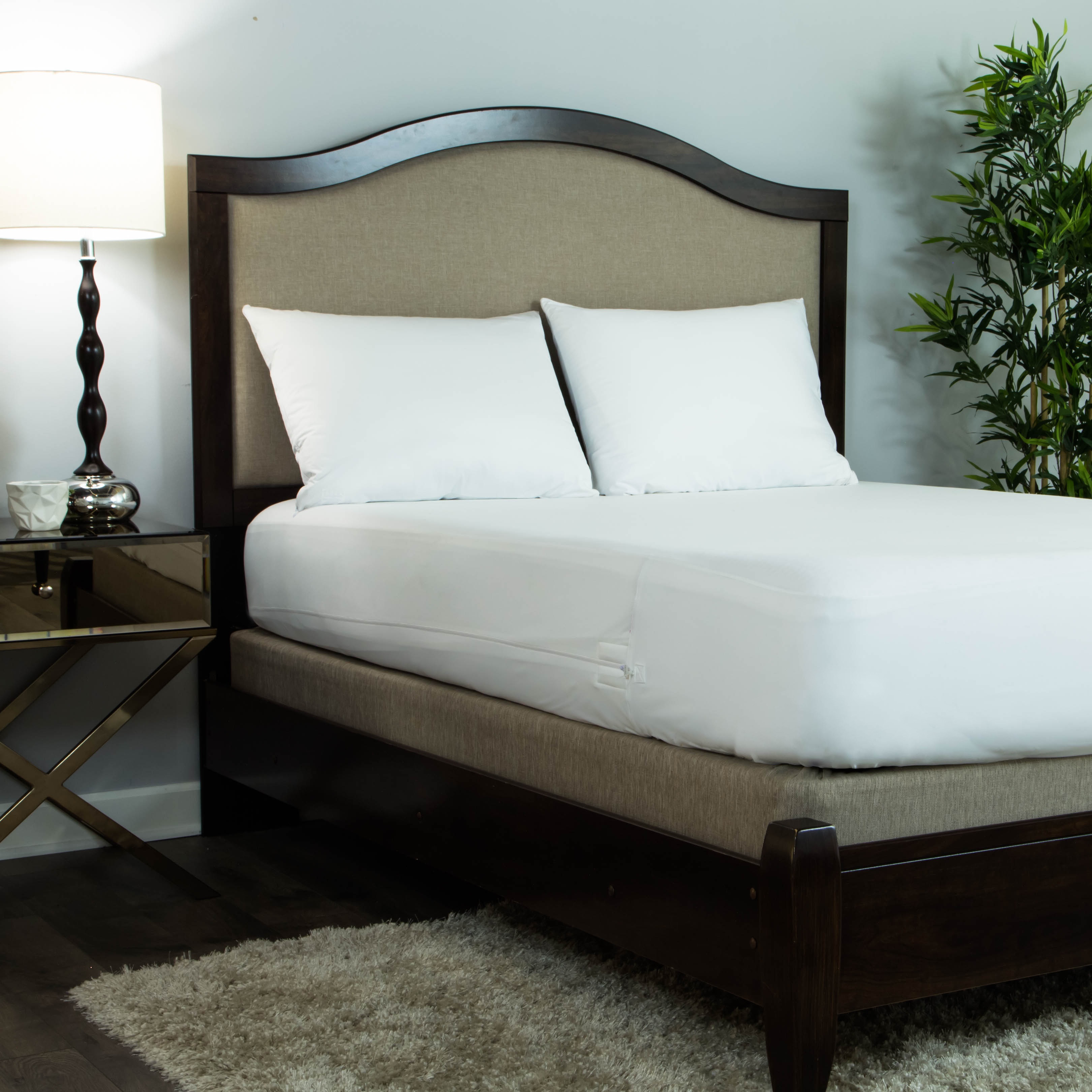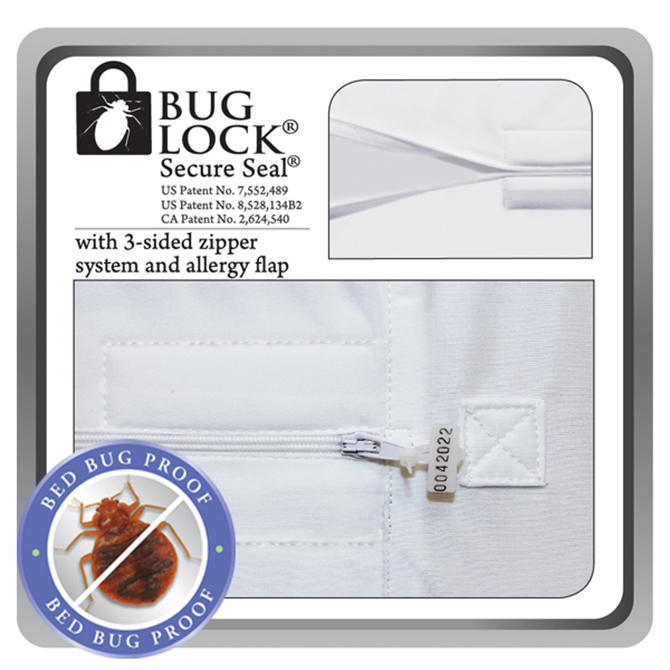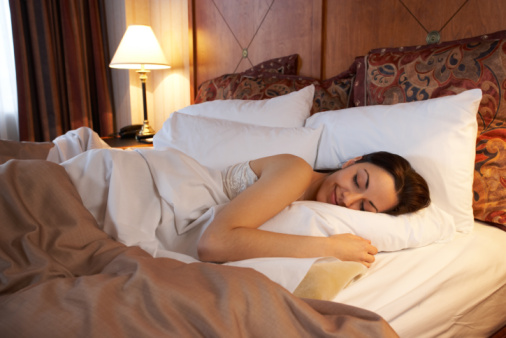Since it’s no surprise that room cleanliness is one of the most crucial factors potential hotel guests research, hygiene matters should ascend to the top of the hospitality priority list. And, considering that customers spend nearly 40% of their stay in bed, mattress care is critical – but not all product protection is created equal.
Hotel hygiene can make or break a property’s reputation and profitability. Bed bugs or other pest infestations, allergens (like skin cells and dust mites), mold, bacteria and fungus are very real concerns for hotel guests. Plus, the increase in pet-friendly properties and inevitable human error (such as accidents, incontinence and spills) are other factors impacting bed cleanliness.
Two well-known solutions – mattress/box spring encasements and chemically impregnated mattress covers – are drastically different solutions, with encasements emerging as the superior option. Encasements can prevent bedding from becoming a bio-hazard, while chemically impregnated covers don’t maintain mattress integrity.
Guests crave cleanliness, and hoteliers need peace of mind when it comes to delivering that to their valued clients. Here are the top five reasons why encasements create a win-win situation as the unrivaled choice in hotel bedding protection.
#1 Complete Coverage = Complete Protection

Being known for having firm mattresses, high-thread-count linens and fluffy pillows is a bonus for hotels, but an emphasis on ensuring the highest levels of hygiene is equally, if not more, important when curating accommodations.
Encasements provide the highest levels of hygiene as they completely envelope the mattress and box spring for unparalleled protection and prevention unlike chemically impregnated covers. For example, Protect A Bed’s AllerZip Smooth Mattress Encasement is a flexible, six-sided, waterproof product that effectively guards against bed bugs, common allergens, pet dander and liquid damage. Most chemically impregnated covers are similar to fitted sheets that leave too much of the mattress and box spring exposed.
The importance of hygiene is serious business for a hotel. Social media power is undeniable, and the financial impact is evident based on positive praise or negative comments. A University of Kentucky survey of nearly 2,100 travelers in the United States found that a single recent review that mentions bed bugs lowers hotel room values by $38 for business travelers and $23 for leisure travelers – not the numbers hotels seek out for success and profitability.
#2 Opt For The Chemical-Free Advantage
Using pesticide-free products and reaping the benefits of their superior protection makes smart hospitality business sense. While being eco-conscious, hotels emerge as a lean, green, bed-bug-and-stain-fighting machine. Plus, an organic-type lifestyle and a hotel’s greenness are mattering to an increasing number of guests, so using chemical-free products becomes an important and distinguishing characteristic for a property.
Encasements are a more effective, waterproof, chemical-free solution for pest infestation protocol and safeguarding hotel bedding assets. Most chemically impregnated covers are soaked in permethrin, a low-level, naturally occurring pesticide, but studies have shown that beg bugs exhibit a high degree of tolerance and resistance to pesticides in this class.
Materials saturated in permethrin require 72 hours to eradicate bed bugs, an impractical measure since beg bugs typically hide in the areas not reached by the chemically-treated cover – they live inside box springs, and then climb onto the mattress to bite sleeping guests. Hoteliers need a solution that can entirely halt a bed bug infestation. According to BedBegCentral.com, “a properly designed encasement will be entry proof, escape proof and bite proof.”
#3 Encasement Efficacy Reigns Supreme
Longevity matters, especially when it’s tied to effectiveness.
The efficacy of encasements supersedes that of chemically impregnated covers, where the suggested replacement time is every 18 months for optimal results. This becomes an expensive proposition for hoteliers for a product that loses its effectiveness over time. Encasements last much longer – approximately a decade before replacement needs to be considered – making them a significantly more cost-effective measure for a product of supreme functionality.
Not only do encasements last longer – waterproof encasements shield the mattress from bed bug’s fecal matter and blood seeping into it, and they can help limit the bed bug population by eliminating hiding places associated with the mattress and box spring. Protect A Bed’s AllerZip Smooth Mattress Encasement successfully answers the call, thanks to breathable fabrics that let air penetrate, but keep moisture (and bed bugs, lice and more) out. Once encasements are in place, hotels can institute other complementary efforts for a total sanitization solution.
#4 Protecting Bedding Assets Enhances Budgets

Hoteliers constantly face the monumental task of providing viable hospitality solutions that benefit the bottom line without sacrificing the quality of the guest experience. Mattresses represent a substantial monetary investment, so ensuring their long life with the best protection in the marketplace is crucial, otherwise, the result is costly, premature replacement of their bedding assets.
Once a mattress is stained, its warranty is voided, so keeping mattresses free of liquid damage and pest infestations is paramount. Encasements are that smart financial solution for hoteliers – one that provides superior mattress protection and safeguards assets without straining operational budgets.
Selecting the right products does more than extend the life of the mattress. It minimizes housekeeping labor (the time spent sanitizing mattresses), reduces the costs of water and cleaning supplies, and decreases lost room revenue due to the down-time when mattresses are cleaned.
#5 Give Guests Good Sleep

Quality sleep revitalizes travelers, and it can powerfully drive bookings. Consider this – according to noted sleep psychologist and Samina Founder Dr. Med. (h.c.) Gunther W. Amann-Jennson, “Guests spend about one-third of their vacation sleeping. Good sleep on a good hotel bed is one of the principle reasons for making a booking in the hotel business.”
Outfitting hotel accommodations with the right products to comfortably lull guests to sleep is imperative – and it encompasses more than just a great mattress, soft sheets and luxuriating pillows. The pesticide-free natural and superior functionality of encasements give hotel guests the necessary peace of mind so they can rest easily – and that satisfying sentiment translates into increased customer loyalty. When guests rest easily, they are more inclined to continue staying at that same property for business or leisure and share positive praise with friends and family via word of mouth or online.
Not all bedding protection is created equal, but the right choices can lead to profitability. Encasements are a pesticide-free, simpler, more cost-effective solution because the product does a complete job without toxic concerns and provides more than a decade of protection on a single purchase. And, the benefits go beyond safeguarding a hotel’s monetary investment in the mattress – using encasements is a strategic financial decision that can yield higher levels of customer satisfaction and loyalty.
